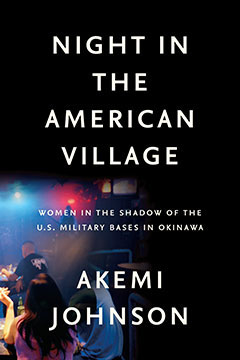“Night in the American Village is not an anti-base polemic but an account of . . . the gray areas outside of pro- and anti-base politics where ordinary women live their lives. The work, here, is to insist on the multiplicity of women’s experiences rather than define one overarching theme, to examine the knot rather than untangle it.”—Jessie Kindig, Jacobin |
“Night in the American Village melds intimate contemporary portraits and vignettes with deep post–World War II history to give us a powerful picture of Okinawan people and political culture today. Akemi Johnson is a truly gifted teller of complicated, engrossing, disturbing, and often unexpectedly uplifting tales. She brings vividly to life what it is like to live at the very heart of America’s global empire of military bases.”—John Dower, author of Embracing Defeat and Cultures of War |
“A multifaceted look at Okinawa and the impact of the U.S. military presence there that is compelling and thought-provoking. It is the best book about modern Okinawa that I have read, and any foreign reporter covering Okinawan issues should be required to read it.”—Jake Adelstein, author of Tokyo Vice |
“Once you know Okinawa, it grabs you and doesn’t let go, and this book does the same. Akemi Johnson is the guide we need to travel to this singular island. Clearly and incisively, she reveals the hidden world of the U.S. military abroad and bears witness to the human spirit that thrives even in the face of oppression. Every American should read this important book.”—Sarah Bird, author of Above the East China Sea |
“At once compassionate and unflinching, Night in the American Village expertly illuminates the consequences of American military presence abroad. Akemi Johnson reveals a national identity fractured by violence, war, and cultural discord.”—James Han Mattson, author of The Lost Prayers of Ricky Graves |
“A deep dive into the intricacies of the lives of those who are dependent upon, yet in danger from, their involvement with the U.S. military.”—Booklist |
“A lively, fascinating mix of perspectives, impressive in both its research and the humanity with which it portrays its subjects.”—The Japan Times |
|
“Night in the American Village is a lively encounter with identity and American military history in Okinawa and America. By turns intellectual, hip, and sexy, with the backdrop of one of the bloodiest battles of World War II and one of the darkest shadows of the American military empire, this is essential reading for our times.”—Anthony Swofford, author of Jarhead |
“A beautifully written, often chilling book that explores the complexities of the U.S. military presence in Okinawa, getting beyond stereotypes and clichés that have dominated conversations about U.S. bases in Okinawa for too long. The book is a model for understanding the historical and contemporary impacts of U.S. military bases in Okinawa and worldwide, including subtleties of colonialism and empire, gender and sexuality, race and ethnicity, power and political economy.”—David Vine, author of Base Nation and Island of Shame |
“A substantial and powerful account of the women whose lives are drawn into the orbit of the U.S. military in Okinawa. Nuanced and meticulously researched, Night in the American Village is a must-read for anyone interested in the intersection of gender, sex, power, and national identity.”—Shawna Yang Ryan, author of Green Island |
“Meticulously researched, this book explores the history of women and the U.S. military in Okinawa from the 1945 battle to the present. Written in deft and evocative prose, Night in the American Village is must-reading for anyone seeking to understand the effects of the vast U.S. military presence in nations around the globe. ”—Steve Rabson, professor emeritus of East Asian studies, Brown University, and author of The Okinawan Diaspora in Japan |
“A searing and stylish debut. . . . This is a must-read look at the impact of the U.S.’s overseas military presence on the people who live near it, cultural collisions, and gendered violence.”—Publishers Weekly (starred review) |
“Gripping.”—Ms. magazine |
|






